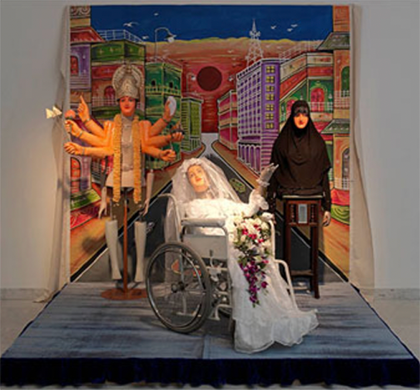
Note 49
The characters in the nine stories published in Out of Print 49 go through a range of emotions and experiences – love, loss, fear, anxiety, thrill, anger, defiance, oppression, release – and confront prejudice, dishonesty and the difficulties of exercising autonomy over their bodies. This is an edition about women and individual agency, new relationships, labour and the pandemic, war and violence, and the essential complexity of human beings.
Praveena Shivram’s ‘Run’ opens with the arresting image of the five-year-old protagonist clutching his grandfather’s severed hand. The reader accompanies the young boy in impactful prose as he navigates fear and survival with his grandfather. Told through dynamic, vivid descriptions, ‘Run’ is a colossal tale that considers family, death and nationalism tempered by simple, everyday pleasures.
In a second story featuring a young boy as the protagonist, Sarveswari Saikrishna’s ‘The Sea’s Call’ is set on Marina Beach in Chennai. Raghu takes pride in making good money hawking snacks after school to help his mother. He stays away from the shoreline, conscious of the treachery of the sea that took his father. And yet, the sea beckons, and a little girl is in danger, and Raghu is faced with a choice.
In Kirtana Kumar’s ‘The Kiss’, the author explores the reverberations of an accidental glimpse of the unexpected. A young girl is abruptly lifted from her dreary everyday existence after witnessing for a fleeting moment a kiss between two men. This singular instance spears all the characters in the story with a wonder and intensity of feeling that stays with them forever. Excerpted from her recently published collection Bangalore Blues, in this episodic story Kumar threads together two disparate worlds aligning by the fortunes of chance.
Shahdat’s ‘Friday Prayers’ translated from Hindi by Akshat Jain follows a young man as he makes it to the mosque for his father, the Imam’s, sermon. When his father elaborates on the sins of homosexuality, pointing to the decadent ways of the practitioners of other religions, Qasim’s mind wanders to life in the madrassa where ‘Often while sleeping someone untied your pyjamas, or you woke up to someone pinching your ass.’ He must, in the course of the day, confront the imbalance between what is said and what is done.
The reader is privy to the delicate unfolding of a new relationship in Amrita Lall’s ‘Boys with Toucan Noses at Thursday Night Parties’. This sweet, intimate story traces the protagonist Anna’s budding relationship with Jamshed, a man she connects with on an online dating app. Full of wide-eyed feeling, this story draws the reader into an exploration of the consuming nature of young love situated in the contemporary dating world.
Cheryl Rynjah’s ‘A Body of One’s Own’ takes the reader along the internal journey of its protagonist Dahun as she tries to schedule an abortion despite familial pressures. Dahun’s feelings are juxtaposed by her sister’s constant vocal gratefulness for her own strenuously achieved pregnancy. Set in a small town in Shillong, this story deals with the extremely current themes of pregnancy politics and women’s bodily autonomy.
A young woman confronts ugly and insidious prejudice as she looks for a place to live in Salini Vineeth’s ‘Nest’. Closely observed, sharply rendered, both setting and character leap out of two-dimensions in this story that is woven throughout with the vulnerability, anxiety, anger and resentment, and desire for privacy that accompany the protagonist’s escape from a violent relationship.
Written in second person, Nidhi Arora’s ‘We Women’ follows a woman’s life as it is buffeted by the instructions that surround her without, and perhaps within. ‘Have you mastered the art of making the perfect roti … rotating it without touching, pressing not too hard, not too soft, gently, down and nudge, down and nudge … gently move the trapped steam from this side to that side, until it is golden brown, a balloon ready to pop. Now go give it to your brother…’ In this commentary on the treacherous and all-pervading influence of patriarchal mores, we wonder whether she will find peace and fulfilment.
Disease has overrun the world, and Jagat’s wife is one of the leaders of the group of construction workers who confront the contractor, demanding proper food for their colony. But Jagat feels such conflict is useless, and that they must wait, and things will get better. Then begins the long, exhausting walk to a distant home that they left out of desperate necessity … and Jagat formulates a radical plan … one which will make any reader of Shilpa Paralkar’s ‘March’ think about why things did not happen that way.
The image on the cover of Out of Print 49 is by Pushpamala N.
